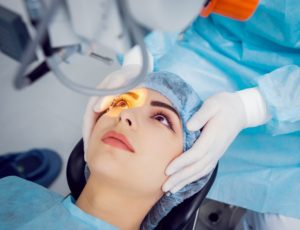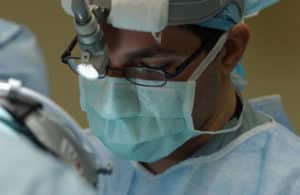Like any procedure, cataract surgery carries the risk of complications, but the risk of developing unwanted side effects or problems is exceptionally low. Research conducted into cataract surgery has found it to be incredibly safe and successful in over 98% of cases. If you’re considering cataract surgery, it’s important to be aware of the risks and potential side effects and to ensure your surgery is carried out by a qualified and experienced ophthalmologist.

What complications might I develop after cataract surgery?
After cataract surgery, you might experience discomfort, bruising, eyelid swelling, high intraocular pressure, increased light sensitivity or an allergic reaction to the medication used during or after surgery. These complications are usually minor and do not last long. Your specialist will monitor them over time.
The most common complication after cataract surgery is posterior capsule opacification (PCO). It involves a cloudy layer of scarring forming behind your lens implant, leading to increasingly blurry or hazy vision. The good news is that it is easily treated with an in-office procedure called a YAG laser capsulotomy. The procedure takes about a minute to perform, and you will see an immediate improvement in your vision afterwards.
The chances of a serious complication occurring during cataract surgery is extremely rare, occurring at a rate well below 1%. Possible serious complications include:
- Posterior capsule tears. These are rarely significant but your doctor may have to adjust their surgery technique to implant the lens in the correct position once the cataract is removed.
- Cystic macular oedema (CMO). It involves swelling of the macula, which reduces your central vision. This is normally treated with additional eye drops.
- Endophthalmitis. This is an infection developing inside your eye. Prompt treatment with the right medication is the key but may also require additional surgery to treat.
- Vitreous or suprachoroidal haemorrhage. This is bleeding at the back of the eye that may require additional surgery.
- Retinal tears and detachments. The retina at the back of the eye sends visual information to the brain. If there is a tear or detachment, then laser and/or surgery may be required.
- Lens dislocation. This is when the lens is not sitting in the correct position inside the eye. This may require additional surgery.
Although these complications are serious, the good news is that they are rare and can be successfully resolved by an experienced ophthalmologist when treated promptly and in the correct manner.
Who should perform my cataract procedure?
Deciding who to perform your cataract surgery is possibly the most important choice you’ll make. It’s crucial you only have cataract surgery performed by an experienced, qualified ophthalmologist. It’s important you assess what sort of qualifications and skills a surgeon has, if they’re registered with the Royal Australian and New Zealand College of Ophthalmologists (RANZCO), if they’ve done any specialised training or research, and what particular procedures or treatments they can offer.
Need cataract surgery?
- Choose Pacific Eye Clinic
At Pacific Eye Clinic, we understand cataract surgery might make you anxious. You might be worried about the potential side effects and complications. We take every measure to ensure our procedures are pain and complication-free. Our specialist ophthalmologist, Dr Marc Wei, is registered with RANZCO and has been performing cataract procedures in Queensland for over twenty years.
He’s established himself as a pioneer of laser (Lensx) surgery and toric and multifocal lens technology, and the procedure he uses involves no needles and no sutures and may mean you won’t need glasses afterwards. Dr Wei and our team would love to help you on your way to better vision. Contact us today on 07 5647 3484.
Author

Dr Marc Wei
Dr. Marc Wei is the principal specialist laser and cataract surgeon at Pacific Eye Clinic in Southport on the Gold Coast. He has 20 years of trusted experience in advanced laser cataract surgery and has completed more than 15,000 procedures over the course of his career.

Dr Marc Wei
Dr. Marc Wei is the principal specialist laser and cataract surgeon at Pacific Eye Clinic in Southport on the Gold Coast. He has 20 years of trusted experience in advanced laser cataract surgery and has completed more than 15,000 procedures over the course of his career.



